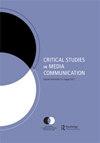白人世俗主义:奈飞《非正统》中宗教的种族化
IF 1.5
2区 文学
Q3 COMMUNICATION
引用次数: 1
摘要
《非正统》是一部四集的Netflix电视剧,为女性主题提供了一个引人注目的从宗教中解脱出来的叙事。本文通过生活宗教的视角(通过将日常生活中的道德意义创造实践视为“宗教”,规避了世俗/宗教的二分法)来质疑这部剧所提供的自由愿景。仔细阅读《非正统》中现存的宗教实践,就会发现有三种道德价值的实践维持了世俗女性的自由:将私人公开化,克服历史叙事,享受快乐。由于《非正统》中女性主体自由的主要障碍是种族化的宗教群体,本文在有关种族他者和宗教自由的文献基础上提出了“白人世俗性”的概念。白人世俗主义是一种信仰体系,它假设每个人都可以自由地选择好的宗教形式,编码为白人,而不是坏的宗教形式。在白人世俗主义中,糟糕的宗教形式被种族化,因为它们使白人在公共领域占据明显的主导地位。通过这种方式,白人世俗主义将女性的自由与种族化的社区对立起来,从而分裂了女性和种族化的少数群体的利益。本文章由计算机程序翻译,如有差异,请以英文原文为准。
White secularity: the racialization of religion in Netflix’s Unorthodox
ABSTRACT Unorthodox is a four-episode Netflix series that offers a compelling narrative of freedom from religion for feminine subjects. This paper interrogates the vision of freedom offered by the show through the lens of lived religion (which circumvents the secular/religion dichotomy by treating the moral meaning-making practices of everyday life as “religious.” A close reading of the lived religious practices in Unorthodox shows three, morally-valanced practices sustaining secular feminine freedom: making the private public, overcoming historical narratives, and taking pleasure. Because in Unorthodox the central barrier to freedom for feminine subjects is the racialized religious community, this paper builds on literature about the racial other and religious freedom to propose the concept of “white secularity.” White secularity is a belief system that assumes every individual can freely opt into good forms of religion, coded as white, and out of bad forms of religion. In white secularity, bad forms of religion are racialized because they make visible white dominance in the public sphere. In this way, white secularity divides the interests of women and racialized minorities by pitting feminine freedom against racialized communities.
求助全文
通过发布文献求助,成功后即可免费获取论文全文。
去求助
来源期刊

Critical Studies in Media Communication
COMMUNICATION-
CiteScore
2.10
自引率
0.00%
发文量
34
期刊介绍:
Critical Studies in Media Communication (CSMC) is a peer-reviewed publication of the National Communication Association. CSMC publishes original scholarship in mediated and mass communication from a cultural studies and/or critical perspective. It particularly welcomes submissions that enrich debates among various critical traditions, methodological and analytical approaches, and theoretical standpoints. CSMC takes an inclusive view of media and welcomes scholarship on topics such as • media audiences • representations • institutions • digital technologies • social media • gaming • professional practices and ethics • production studies • media history • political economy. CSMC publishes scholarship about media audiences, representations, institutions, technologies, and professional practices. It includes work in history, political economy, critical philosophy, race and feminist theorizing, rhetorical and media criticism, and literary theory. It takes an inclusive view of media, including newspapers, magazines and other forms of print, cable, radio, television, film, and new media technologies such as the Internet.
 求助内容:
求助内容: 应助结果提醒方式:
应助结果提醒方式:


